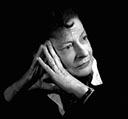
Alan Frank
Throughout her life Phyl’s indispensable companion was her husband Alan Frank. Alan was brought up in Brixton. His father Henry lived well into his nineties and Alan was the youngest of his three sons. However, Alan’s musical talent came from his mother Fanny, who was a gifted violinist - though never a professional one - and also a student of Brahms’s violinist, Joseph Joachim. However, she died before Phyl could know her. Alan got a scholarship to Dulwich College, one of the first Jewish boys to do so, and subsequently studied clarinet under Frederick Thurston, with whom he wrote the now classic A Comprehensive Method: The Clarinet. Thurston’s widow, Thea King, also a well-known clarinettist, was a lifelong friend and they collaborated on several books of arrangements of classical music for clarinet and piano, which are still used today as examination material for the Associated Board of Music.
He met Phyl while working as an office boy in the music department of the Oxford University Press (OUP) and, despite vigorous opposition from Alan’s Jewish family, they were married in 1935. During the war he served as an intelligence officer for the RAF in England and Ceylon, with the rank of squadron leader.
Alan Frank talking to Vaughan Williams and cellist Gregor Piatigorsky at the launch of The International Music Fund
Alan and Phyl at a music industry event
Alan and an unknown friend
He returned to OUP after the war and rose to become head of the music department, a position he held until his retirement in 1975. In this capacity he championed British composers, including Ralph Vaughan Williams and William Walton, here and abroad, and was tireless in promoting their works with performers and conductors. Alan also wrote books, articles for musical journals, musical criticism for major UK papers, and broadcast talks on contemporary music. His laconic and witty Suite for Two Clarinets is still played. He was an unflagging catalyst to Phyl’s creativity and her most valued critic, and used his innumerable contacts in the music world to promote performances and broadcasts of her work. In addition his accomplished playing of, and enthusiasm for, the clarinet was an inspiration for the many pieces of music that Phyl wrote for that instrument.
Apart from music they had a common interest in art and architecture, as well as a love of the English countryside, especially East Suffolk, where they had a tiny workers cottage as a holiday retreat for many years. Their many friends in the musical and artistic world ensured that their home life was socially rich and rewarding, with Alan’s more extrovert nature an effective foil to Phyl’s more retiring character.
Alan and Phyl outside their cottage in Suffolk
Alan and Phyl in Israel
Alan outside their Hampstead home
Copyright www.phyllis-tate.com - All rights are reserved. Admin email: admin@phyllis-tate.com